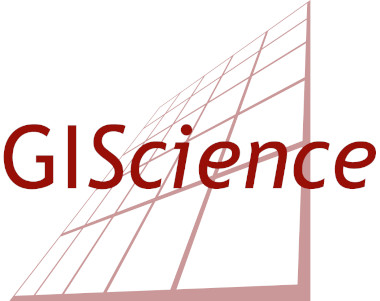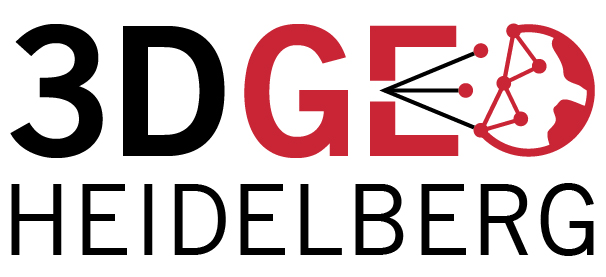Tag: 3D
-
Third Workshop on “3D Field Methods in Geosciences”
The third workshop on 3D methods in geological applications was jointly organized by the University of Göttingen, the Geological Service of North Rhine-Westphalia (NRW, German federal state), and the 3D Geo Research Group at Heidelberg University. The workshop is an event of the initiative “3D Field Methods in Geosciences”, which provides a platform to connect…
-
Today Two free GIS Events @Heidelberg
Today you have the choice to select between two interesting GIS related events @Heidelberg with contributions by GIScience Group Heidelberg University: Geobasierte Modelle. 14. Modellierungstag Rhein-Neckar am 1. Februar 2018 (in German, @Mathematikon HD, 14.00-18.00) European Citizen Science Association Webinar on #citizenscience for monitoring urban landscape dynamics (in English, Online-Webinar, 16:30-17:30) It’s your choice. Enjoy!…
-
14. Modellierungstag Rhein-Neckar am 1. Februar 2018
1. Februar 2018 – 14:00 Uhr Mathematikon Im Neuenheimer Feld 205 Konferenzraum 5. Etage 69120 Heidelberg Der Modellierungstag Rhein-Neckar eröffnet Praktikern und Wissenschaftlern die Gelegenheit, Innovationen zur Diskussion zu stellen, Gemeinsamkeiten und Unterschiede der verwendeten Modellierungsansätze herauszuarbeiten und den gegenseitigen Erfahrungsaustausch zu pflegen. Weitere Informationen finden Sie hier: http://www.modellierungstag.de/ Programm 14:00 Michael Winckler (IWR, Universität…
-
Mobile low-cost 3D camera maize crop height measurements under field conditions
Maps of the spatial distribution of crop heights can strongly support agriculture in terms of efficiency and yield optimization. Recently published results of experiments of the 3D Spatial Data Processing research group describe an approach to easily extend regular agricultural machines with low-cost sensors for capturing crop heights while the machine is in the field.…
-
3D geodata acquisition in the Siberian Arctic
In September 2017, the 3D Spatial Data Processing Group (3DGeo) joined the German-Russian expedition of the Alfred Wegener Institute (AWI) for Polar and Marine Research to the Arctic research station Samoylov (N 72°22’, E 126°29’) in the central Lena Delta. Under the lead of Julia Boike, the research team maintained and expanded long-term monitoring stations…
-
LiDAR meets Art
An interesting 3D art project using point clouds of the 3D Spatial Data Processing research group of Prof. Bernhard Höfle (3DGeo) was recently realized by artist Gerrit Frohne-Brinkmann. The data were acquired from natural karst cave features in the Dechen Cave near Iserlohn, Germany both with a low-cost Kinect sensor and terrestrial LiDAR. For the…
-
GIScience group members at the ISPRS Geospatial Week 2017 in Wuhan, China
Last week (Sept. 18-22, 2017), our six colleagues, Prof. Alexander Zipf, Doctoral Candidate Xuke Hu, Dr. Hongchao Fan, Dr. Martin Hämmerle, Dr. Zhiyong Wang, and Dr. Wei Huang, participated in the ISPRS Geospatial Week 2017 held in Wuhan, China. In the opening ceremony on Sept. 18, 2017, the U.V. Helava Award was presented to Dr.…
-
Study “Multiscale analysis and reduction measures of urban carbon dioxide budget based on building energy consumption” published
The 3D spatial data processing group had the opportunity to collaborate with the team of Prof. Tzu-Ping Lin from National Cheng Kung University, Tainan, Taiwan, within the frame of a study dealing with carbon emission reduction measures in urban environments. One option of reducing carbon emission by buildings is to install photovoltaic (PV) panels in…
-
Determination of building inundation depths based on user-generated flood images – new study published
In our recently published study “Direct local building inundation depth determination in 3-D point clouds from user-generated flood images” we present a new approach for deriving local building inundation depth from ordinary user-generated flood images captured during a flood event. After reconstructing a 3-D scene of the building of interest with close-range photogrammetry (CRP) algorithms,…
-
Martin Hämmerle receives PhD
Yesterday, our colleague Dr. Martin Hämmerle defended his PhD thesis with great success. We would like to congratulate him – with our sincere thanks for his hard work and amazing research the last years. Martin is an expert on 3D geodata (with focus on 3D point clouds from LiDAR and photogrammetry), methods for 3D processing…
-
3D bathymetry measurements in shallow-water environments with a low-cost sensor – study published
To take bathymetric measurements in areas with shallow water is very challenging for methods such as SONAR or bathymetric LiDAR. In our study “Assessing the Potential of a Low-Cost 3-D Sensor in Shallow-Water Bathymetry”, we examine the performance of a low-cost 3D camera when capturing bathymetry in waters up to 0.4 m depth. The tested…
-
Bernhard Höfle becomes new full professor for Geoinformatics and 3D Geoprocessing at Heidelberg University
Since April 1st, 2017 Prof. Dr. Bernhard Höfle is the new full professor for “GIScience and 3D Spatial Data Processing” at the Institute for Geography, Heidelberg University. Last week he was formally introduced to the scientific community of Heidelberg University during the traditional “Professorium” event, which was moderated by Rector Prof. Eitel. The latter took…


